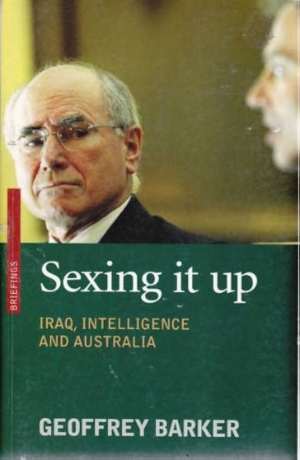Iraq War
We’ve all seen the video. The black and white images are washed out, almost solarised, by the heat and glare of a Baghdad morning in 2007. As the men walk and mingle on the street, we can make out the length of their hair, pick out the skinny from the stocky, and identify what they are wearing, loose trousers, casual shirts – one with distinctive broad stripes. Mercifully, we cannot discern their individual features. All the while, the Apache helicopter hovers, unseen and unheard, its cameras trained on the men below. The crew exchange terse messages with US troops in the area and their commanders back at the flight line. Having identified weapons that the men carry and confirmed that they are not coalition forces, the crew request and receive permission to engage, manoeuvring the gunship to get a clearer shot.
... (read more)Nick Hordern reviews 'Exit Wounds: One Australian's War On Terror' by John Cantwell with Greg Bearup
To go into any bookshop, if you can still find one, is to be amazed at the space devoted to militaria: endless shelves of books not just about the two world wars and Vietnam, but all wars in all times. This vicarious fascination with war echoes another phenomenon of our time: the rise of overt public respect for soldiers.
... (read more)Peter Haig reviews 'An American Notebook: A personal and political journey' by Michael Gawenda
As the full extent of the American misadventure in Iraq becomes increasingly clear, liberal hawks, neo-conservatives and others who lent their voices to the initial call to arms have had cause to reconsider their positions. The rush to recant, however, has not exactly been a stampede. For the majority of its proponents, the decision to invade Iraq was so tied to an entrenched philosophy or ideology that to renounce the invasion would entail a more wide-reaching abandonment.
... (read more)Michael Fullilove reviews 'The International Struggle Over Iraq: Politics in the UN security council 1980–2005' by David M. Malone
Public debate in Australia about the United Nations is remarkably thin, and it is dominated by two familiar tribes of pundits: UN groupies and UN bashers. The groupies defend the international organisation come what may: they are suspicious about the motives of nation-states – especially the United States – and they get an attack of the vapours every time Kofi Annan appears at a lectern. UN bashers, on the other hand, never saw a Security Council resolution they liked. They scoff at the time it takes states to argue their differences, bristle at the idea of dealing with non-democracies, and propose American power as an alternative organising principle for the world. Neither group, in other words, takes a balanced or realistic view of the world body. They are so busy praising the UN or burying it that they don’t have the time (or, rather, the column inches) to analyse it.
... (read more)Jonathan Pearlman reviews 'Righteous Violence: The Ethics and Politics of Military Intervention' edited by Tony Coady and Michael O’Keefe and 'A Matter of Principle: Humanitarian Arguments for War In Iraq' edited by Thomas Cushman
The fears and tensions in the aftermath of September 11 created an unusual political climate in the US, in which it became possible for the government to lead an invasion without having to explain precisely why. Nobody seemed to quite know who or what was guiding the administration as it led the charge for war: was it utopian neo-conservatives trying to reshape the world in America’s image? Was it isolationist hawks trying to wipe out an old foreign foe? Was it oil-hungry Texans? Was it paranoid security advisers, regretful of their failures and with a new bent for pre-emption, no matter how distant the threat?
... (read more)Nathan Hollier reviews ‘Sexing It Up: Iraq, intelligence and Australia’ by Geoffrey Barker and ‘Why the War was Wrong’ edited by Raimond Gaita
Like several other publishers, UNSW Press and Text Publishing have produced responses to the recent war against Iraq. The intention appears to be to engage critically with popular perceptions of the war before these harden into accepted historical ‘memory’. The potential benefits of quickly produced, historically aware and politically critical books, which collate and deal comprehensively with the existing evidence and arguments raised by the mass media on a particular issue, are obvious. The two main dangers with publications of this type are that editing and production standards may slip and that the desire to compete with mass-media forms may lead to a replication of, rather than an alternative to, standard journalistic commentary.
... (read more)It has been raining all week, persistent drizzle unlike the brief downpours that are more typical of Beirut. The city is slumbering. I am staying with my parents. My father goes out less often. My mother is snuggled under the blankets. She hopes the war won’t happen. The kettle is boiling like a purring cat. The house is quiet. Rain is the soporific of cities.
... (read more)'Only as a Last Resort: Reflections on War and Justice' by Raimond Gaita
The looter held a sign in one hand as he pushed a trolley overflowing with stolen goods in the other. His sign read, ‘Thank you, Mr Bush’. It was not, I suppose, the kind of gratitude George W. Bush had expected. The next day’s looting was not likely to raise a smile: private homes, great museums, and hospitals were ransacked. Vigilantes exercised rough and sometimes cruel justice. There will be worse to come when mobs catch Saddam Hussein’s brutal functionaries. Again, we will be reminded that oppression does not even make people noble, let alone good.
... (read more)





